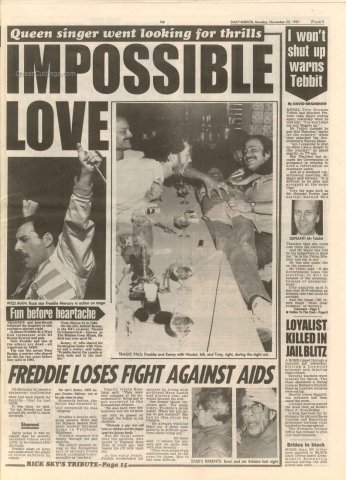From WikipediaLater lifeThe radio shows continued in the same vein and were as popular asever, but by the late 1980s the TV show format had run its course, andEverett's personal life was becoming increasingly complicated. He hadmarried the singer Lee 'Lady Lee' Middleton (Billy Fury's former girlfriend) in 1966. By 1979 they had separated, and Everett came out as gay. He launched himself into the London gay club scene, and could often be seen in London club Heaven in the 1980s (then a very popular clubbing destination) on Saturday nights. Everett had been told in 1989 that he had HIV. It is believed he caught it from Freddie Mercury's partner, with whom he had also had a relationship.[7] He died from an AIDS-related illness, in the Royal Borough of Kensington and Chelsea, London,[8] on 4 April 1995, aged 50. |
About Nicolai Grishanovich , Freddie and Others
From Fyne TimesHis time in the wilderness was ended when he eagerly accepted an offerfrom Capital Radio to headline their flagship breakfast show. It waswhilst at Capital that he met Freddie Mercury. The two men were kindredspirits. They knew they were gay, but both were in a relationship witha woman. In return for Freddie’s friendship, Everett helped promoteQueen’s music at every turn. He famously was the first to air BohemianRhapsody after a demo tape was sent to him with strict instructionsfrom Freddie not to air it, but simply to give his opinion on it.Everett loved it and played it fourteen times over the space of oneweekend, claiming to his boss on every play that ‘his finger slipped’.Through his cheeky disobedience, Everett helped to bring the mostpopular track of all time into the charts. At the end of the 70s, Everett made the leap from radio to TV. Starting with a TV clip request show for London Weekend Television, the iconic style of the Everett show started to emerge. The idea moved through various shows and from channel to channel, and what emerged was a highly popular sketch show combining regular fictional characters interspersed with pop music. Similar to his radio shows (and using a few of the same characters such as Captain Kremlin, Sidney Snot and Brother Lee Love), the Kenny Everett Show was a massive hit and became the crowning glory of 1980s light entertainment. Throughout the decade, the various incarnations of Everett’s show were repeated (it is rumoured that the shows will hit national TV again in 2006). The shows propelled Everett from a faceless but popular DJ into a national darling. He was soon given the nickname ‘Cuddly Ken’ such was the public’s admiration. During the mid 80’s, he also began to frequent gay nightspots inLondon, especially the famous nightclub Heaven. Many of these clubs atthe time had a ‘club room’ or ‘dark room’ which was especially reservedfor selected clientele. Everett and Freddie Mercury often frequentedthese rooms, not aware that they were putting themselves in danger fromthe new mystery killer illness. The reality of his lifestyle did notcatch up with him until the late 80s when Nicolai Grishanovich, theRussian soldier in his ménage-a-trois announced that he had contractedHIV. Soon after, Everett was also diagnosed with the killer illness.Mercury was also secretly suffering with HIV. Grishanovich has sincegone down in modern folklore as the kissing link between the two, theman who infected them both. |
|
|
|
|
© Kenny-Everett |


